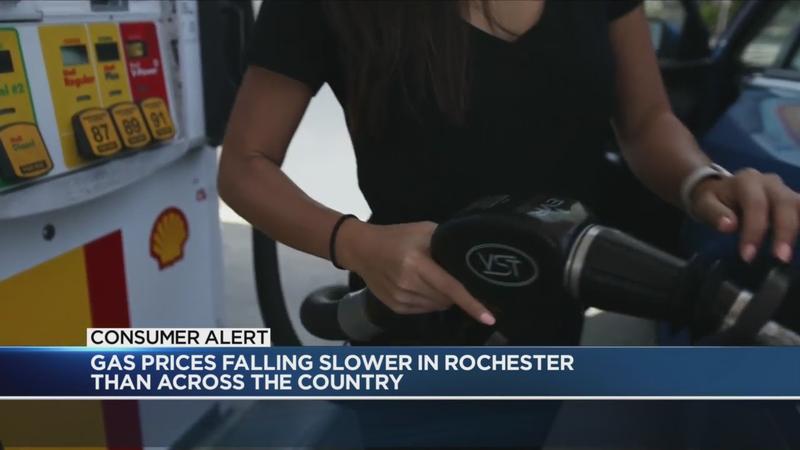Consumer Alert: So where did the gas tax savings go? The data may have the answers
[anvplayer video=”5123260″ station=”998131″]
ROCHESTER, N.Y. (WHEC) — Did you fill up today? The price of gas is coming down in Rochester, albeit very slowly. The average price of a gallon of unleaded in Rochester on Wednesday was $4.75. The average price nationally is 29 cents lower. Up until June 1st, the launch of New York’s gas tax holiday, that was normal. The price of regular unleaded in Rochester was always 10 cents to 30 cents higher than the national average price. But that was not the case immediately after the gas tax holiday began.
As I explained in detail on Tuesday, I’ve analyzed four and a half months of data and am seeing a troubling trend.
As gas prices fall across the country, prices are falling far more slowly here in Rochester. So that gas tax savings that’s supposed to be passed on to the consumers seems to be dwindling as quickly as the fuel in your tank. First I analyzed gas prices for three months before the gas tax holiday, comparing the average price in Rochester to the average price nationally. And it was always higher in Rochester, on average 17 cents.
But the gas tax holiday that started on June 1, 2022 brought our price down to the national average. For the first three weeks of June, gas in Rochester averaged 4 cents lower than the national average price. But it seems those savings started slipping away in late June.
That’s when the data shows the rate at which the price of gas was falling in Rochester was far slower than it was falling nationally. And since June 27th, gas in Rochester has been on average 15 cents higher with the gap between Rochester’s price and the national average widening a few cents each day. And that begs the question: Is the same phenomenon happening in New York following the implementation of the gas tax holiday that has occurred in other states? A study by the University of Pennsylvania of gas tax holidays in three states showed that while consumers benefited initially, eventually middlemen and retailers absorbed the gas tax, and consumers benefited little.
I reached out to county and state leaders to get a reaction to the data, but those I reached did not address the matter. Gary Walker, Monroe County’s communications director said,

“The County Executive has done all he can under his control to help reduce gasoline costs. He capped the county sales tax and sent inspectors to check that stations were following the law.”
That was not in question. What is in question is whether the well-intended state and county measures are really benefiting consumers.
Because retailers set their own price for gas, is it even possible to enforce the gas tax holiday? I reached out for a reaction to the data from the state attorney general, but a spokesman for her office referred me to another state department, even though Attorney General James sent out a press release in June saying she was strictly enforcing the gas tax holiday.
Policy wonks, like those at the Tax Policy Center argue gas tax holidays are ineffective. New York state legislators argue they had to do something to provide consumers with some measure of relief. This is an issue I’ll keep investigating.